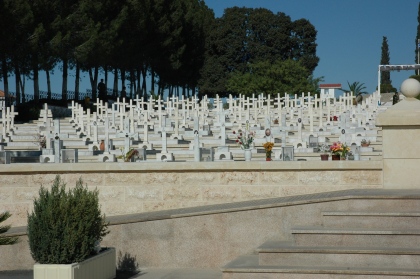
Maria Spassova
Special grreporter.info correspondent in Nicosia
Early morning, in front of the “Macedonitza” graveyard, the guards of honor are in order in front of the tomb awaiting the governmental delegation. The army orchestra is ready to perform the national anthems. The place is somehow striking respect. Not only because it is a tomb but because it is a military graveyard. It is not by accident that the visit of this place in included in Kostas Karamanlis’ schedule.
This is the place, where the military airplane Nord Atlas crashed, which together with two more airplanes departed from Crete, in order to help the Cyprian army to fight the Turkish invasion. All three military planes flew without any lights on, in order not to be noticed by the Turks. Cyprian soldiers believed the planes were Turkish and took one of them down – Nord Atlas, which crashed in “Macedonitza” graveyard near Nicosia. The night was July 22nd 1974.
All Greek soldiers but one, on board died. Since then, this place was transformed into a military tomb. 506 soldiers, who died for Cyprus’ freedom, were buried there. Most of them were Greek Cypriots but there are also Turkish Cypriots and some British citizens.

In front of the tomb, a veteran from the liberation war of Cyprus 1955-1959 is waiting for Kostas Karamanlis with the Greek flag and a bunch of basil. He gave me some basil too and told me that he has three British bullets in his chest. But he survived and every year since then, on July 22nd, he comes to the tomb to leave a bunch of basil on his friends graves. Not, he is here to greet Karamanlis.
 The official delegation arrived. The etiquette is flawless – military honors, anthems, laying the wreath, the short speech reminding the history, the minute of silence… I put down the basil on one of the graves and I tried to read the name. Pointless. The time, the wind and the sun have almost destroyed the writing.
The official delegation arrived. The etiquette is flawless – military honors, anthems, laying the wreath, the short speech reminding the history, the minute of silence… I put down the basil on one of the graves and I tried to read the name. Pointless. The time, the wind and the sun have almost destroyed the writing.

Kostas Karamanlis’ next stop is at another sad place – the prisoners’ graves in the central prison in the Cyprian capital. A place, which is directly connected with Cyprus’ fight for independence against the British Empire. Those are the graves of the freedom fighters, who were hanged by British soldiers. They were literarily buried – the governor of the island did not allow any funerals, because he was afraid that their funerals might turn into protest processions against the regime. No family member and not even other Greeks could be present at the burial.